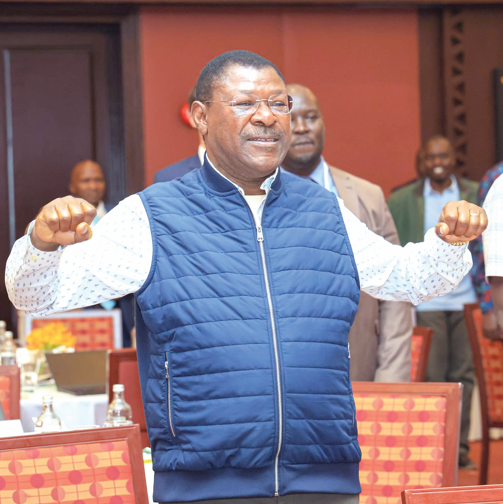Pricked Wetang’ula bemoans missing committee leadership
By Anthony Mwangi, October 30, 2024A frustrated Speaker of the National Assembly Moses Wetang’ula yesterday warned committee chairpersons and their deputies that they would be removed from their positions if they repeatedly skip House sittings.
Wetangula underscored the crucial role committee chairpersons play in the House business, where they serve as key liaisons between the Legislature and the Executive.
“You are the primary point of contact and oversight for Cabinet interactions. Cabinet members appear before you and before the Plenary, and you must engage with them on a deeper level than just the questions posed on the floor,” he stated.
He warned: “Sadly most of you have been skipping crucial House sittings where you are expected to respond to statements and questions presented before your committees. We will have no option but to remove you from the positions”
Addressing a retreat for the National Assembly leadership in Naivasha, Wetang’ula emphasised his commitment to streamlining legislative processes and eliminating unnecessary delays.
“You can’t fulfill this responsibility if you don’t attend House sessions and listen to members’ contributions,” said the Speaker.
He added: “If you’re consistently absent from committee meetings, you’re essentially relinquishing your authority to your vice-chair, only showing up to sign the attendance sheet or make a brief appearance on camera. That should never be the case. Let’s commit fully to leading our committees effectively.”
Lack of quorum
He said he had informed the leadership—including the Leader of the Majority Party and the Leader of the Minority Party—that committee chairpersons and vice-chairpersons, that if all chairs of committees and vice chairs attend sittings, the House would never lack quorum at any one time.
Wetang’ula told the members that they hold positions of privilege and should therefore lead by example by attending sittings as required of them.
“You receive additional compensation and enjoy travel privileges because you are leaders. The least you can do in return is to consistently attend House sessions and actively push forward parliamentary business,” Wetang’ula said.
The Speaker emphasized that parliamentary standing orders do not mandate fixed debate duration for bills, allowing flexibility based on interest and the chair’s discretion.
Prevent delays
He urged committee leaders to maximize this flexibility by maintaining attendance and engaging actively to prevent delays in House business.
“I encourage avoiding the need to call for a quorum bell from the House floor. In other comparable jurisdictions, like the House of Commons, it’s usual to see only about 10 members present in the chamber on a typical afternoon,” Wetang’ula explained.
“Other members are often engaged in committee rooms, prepared to return to the House when needed. The Whips play a crucial role, especially during voting, by calling members back to ensure quorum, as voting without quorum would be unlawful.”
He added, “The quality of legislation doesn’t depend solely on the debate on the House floor. Instead, it is grounded in the quality of the bill’s draft, the thoroughness of public participation, and committee work. By the third reading, if committee chairs have rigorously examined the bill, consulted the stakeholders, and interrogated the bill’s proponents, any necessary amendments will have been addressed, ultimately shaping high-quality legislation.”
The Speaker warned that any bill, motion, or petition called for response or debate by an absent chairperson, vice-chairperson, or MP would be immediately set aside. This directive, he noted, is intended to foster greater accountability and efficiency in the handling of House business.
This even as Wetang’ula expressed frustration over the frequent delays and dismissals of critical bills, motions, and public petitions due to the unavailability of the sponsoring members.
He highlighted that issues raised by members of the public or other lawmakers often face significant delays or fail to proceed due to the absence of the members responsible for them.
Private member’s bill
As part of a reinforced procedural approach, the Speaker affirmed that, moving forward, any private member’s bill, motion, or petition will be discarded if the relevant member is absent from the House without valid justification. This measure, he stated, is essential to ensure a focused and effective legislative process and to reduce the current backlog.
“We have seen, as the leadership and sometimes, according to the Whips’ reports to the Speaker, that a member is sponsoring a bill or motion week after week, yet when the matter is called, the member is nowhere to be found,” Wetang’ula lamented.
“To make matters worse, they haven’t even informed the chair of their absence or instructed another member to stand in for them.”
He added, “As leadership, we may need to reach an agreement. To avoid piling up work for those who don’t show up to advance their agendas, we’ll consider dropping items that appear on the Order Paper two or three times if the responsible member is uninterested. This way, we avoid creating a backlog of House business.”
The Speaker emphasized that once a petition, bill, or motion is dropped due to a member’s absence, it is the member’s responsibility to face their constituents—such as teachers who may have sponsored them—and explain why they were not in the House when the matter was called.
He clarified that this approach aims to prevent accumulating unnecessary work, not due to any failure in leadership but rather due to the negligence of certain members responsible for advancing this business.
